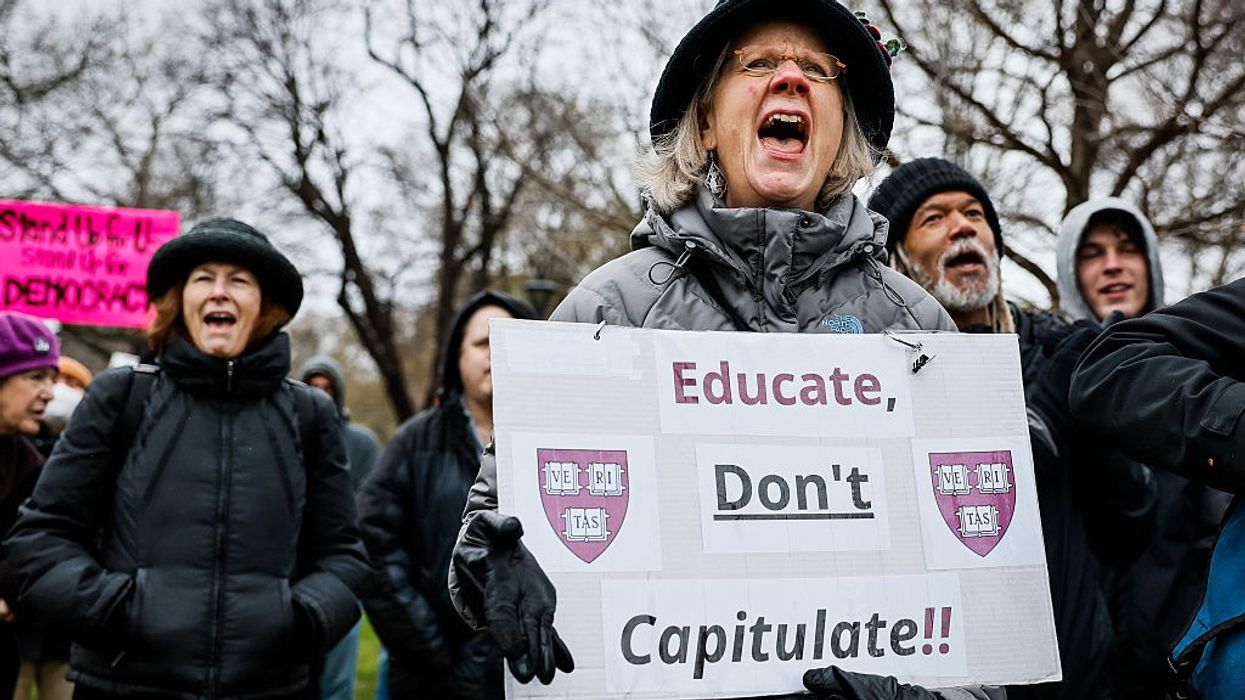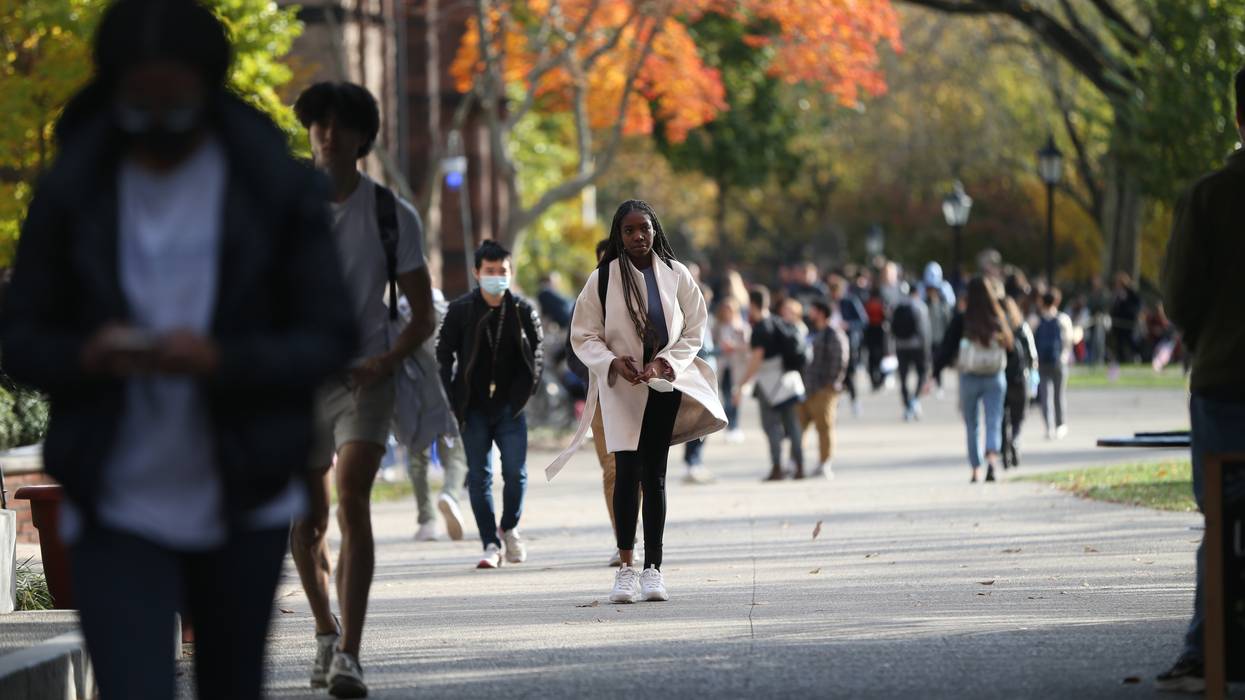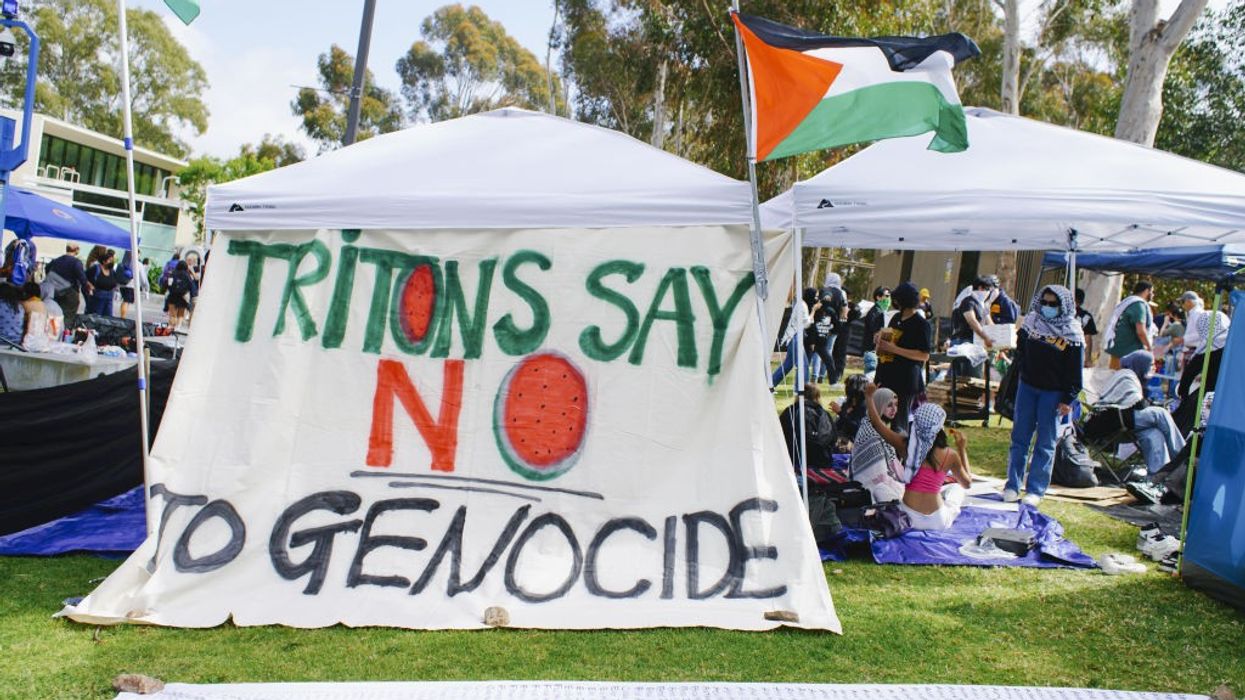Universities Didn't Fail, They Succeeded—That's Why They're Under Attack
Universities need to recognize that they are being targeted because of what they represent, not because of what they've failed to do, and resist accordingly.
I grew up watching my mother teach histories she was forbidden to teach, in a language that was illegal to speak. I know what authoritarianism looks like. And I'm watching American universities respond to this moment with the same dangerous pattern I witnessed then: accepting the narrative of their accusers, capitulating to illegal demands, destroying themselves from within.
At a time when blue cities become military zones, when citizens are arrested and abused on camera, when journalists are forced to transform from truth tellers to White House publicists, when the president accepts planes as gifts from foreign governments and then offers them military bases on US soil, it is not a moment for universities to ask, "What did we do wrong?" This is a moment to recognize: We are living through an authoritarian takeover, and universities are being targeted because of what they represent, not because of what they've failed to do.
The Trap of the "Universities Failed" Narrative
Across the country, university leaders are grappling with attacks on their institutions by asking: "How did we get here?" But without proper historical analysis, these questions lead directly into a trap set deliberately by those who seek to dismantle higher education as we know it.
The narrative is seductive: Universities became too focused on diversity, equity, and inclusion (DEI). They pushed "woke ideology." They marginalized conservative voices. They failed to serve their students properly. And now, this narrative suggests, they're reaping what they've sown.
When universities face these attacks, they have a choice: Resist in solidarity with the broader democratic struggle, or accept the framing of their accusers and try to appease them.
This is all a lie. More precisely, it's what political theorist Isaac Kamola calls a decade-long psychological operation, a well-funded, well-organized campaign of disinformation designed to make Americans believe that what's happening in universities is not what's actually happening.
The reality? American higher education has more women enrolled than ever before. More people of color than ever before. An educated populace is a civically engaged populace, a populace capable of critical thinking and democratic participation. Universities haven't failed. Universities have been succeeding. And that success threatens the wealth and power of those orchestrating these attacks.
Understanding the Authoritarian Playbook
We’ve seen this script before. Universities are always the first targets of authoritarian regimes. Look at Hungary, where Viktor Orbán seized control of higher education through a national system, banned gender studies programs, and forced the Open University to leave the country. Look at Turkey. After 2016, more than 6,000 academics were expelled in Turkey, hundreds prosecuted, and entire universities were closed. Many dismissed scholars were banned from public sector employment and from seeking academic work abroad due to travel bans, creating widespread precarity and self-censorship among remaining faculty. The pattern is unmistakable and deliberate.
When universities face these attacks, they have a choice: Resist in solidarity with the broader democratic struggle, or accept the framing of their accusers and try to appease them. History shows us that appeasement doesn't work. It only accelerates the destruction.
Look at Brown and Columbia. In both cases, Brown and Columbia accepted Trump administration demands largely to avoid funding cuts, yet both remain under sustained attack from the administration. Rather than fighting to preserve institutional independence and democratic principles in higher education they have accelerated the authoritarian takeover by capitulating.
We are watching universities and their leaders across America choose the second path. They're eliminating DEI programs, not because they believe these programs are wrong, but because they're afraid of losing funding. They're censoring faculty, not because academic freedom suddenly matters less, but because trustees are buckling under financial threats. They're accepting the premise that they somehow deserve what's happening to them.
They are playing into the tiny hands of authoritarians.
What's Really at Stake: Race, Rights, and Democracy
If we take a historical view, we can see more clearly what's actually driving these attacks: race. The legislative assault on curriculum, the attacks on critical race theory, the dismantling of DEI programs, all of this escalated in inverse proportion to the access that Black and brown people were gaining to higher education.
The bookeyman of DEI is a strategic tool for turning civil rights laws on their heads, for weaponizing the very protections meant to ensure equity. When White House Deputy Chief of Staff Stephen Miller tells law enforcement they're "unleashed," when apartments on Chicago's South Side are raided and destroyed in the middle of the night and families, including citizens, are separated and detained for hours, when the National Guard is deployed to terrorize Democratic cities with large populations of Black and brown people, we're watching the same white supremacist project that universities are being punished for challenging.
Powerful interests have recognized how threatening an educated, diverse, critically thinking populace is to their accumulation of wealth and power.
Chris Rufo has been explicit about his counterrevolutionary agenda. He accuses universities of ideological capture and promotes a fiction: that radical leftists completed a "long march through the institutions" from the 1960s to today, turning universities into engines of woke ideology. His strategy has been devastatingly effective, tying federal funding to demands that colleges eliminate "race-based" programs and DEI initiatives, end political activism on campus, and enforce what he falsely calls "ideological neutrality." The bitter irony, of course, is that this neutrality means alignment with conservative values. Authoritarian regimes always claim neutrality while enforcing ideology.
The actual transformative change that generations of civil rights leaders have fought to achieve in higher education has been painfully, frustratingly slow. As Dr. King reminded us, the arc of the moral universe is long. Diversity, equity, and inclusion work had just begun when the backlash hit. As Isaac Kamola reminds us, we haven't gone too far, we've barely started. And that's precisely why the backlash is so fierce. Progress, however incremental, is intolerable to those who benefit from the status quo.
The Rapid Response Trap
Rapid response to individual attacks, while sometimes necessary, keeps universities perpetually defensive and reactive. Each response accepts the terms of the debate as set by those seeking to destroy higher education. Today, it's a demand to eliminate a DEI office. Tomorrow it's a threat to revoke accreditation. Next week, it's federal agents on campus or trustees forcing out presidents who won't comply. The exhausting onslaught of breaking news pushes institutions into pure survival mode, where they can only see the immediate threat in front of them. Meanwhile, the bigger picture, the systematic dismantling of democratic institutions, disappears from view.
This is how authoritarianism works. It overwhelms. It exhausts. It forces you to fight a hundred small battles so you cannot see the war.
And when universities respond by looking inward, by searching for their own failures, by implementing "reforms" that mirror the demands of their attackers—cutting DEI programs, restricting faculty speech, purging curricula of "controversial" content—they believe they're defending themselves. They're not. They're participating in their own destruction. Worse, they're legitimizing the authoritarian narrative: that universities deserved what's happening to them, that the attacks are a reasonable response to institutional failure rather than a calculated assault on democratic education itself.
This is precisely what authoritarians count on: that institutions will police themselves, that fear will accomplish what force alone cannot.
What Universities Must Do Instead
First, universities must stop accepting the false premise that they've failed. Higher education remains one of the most important engines of democratic participation, social mobility, and civic engagement in American society. The Truman Commission understood this in 1947: Higher education's core mission includes preparing citizens who can respond to social needs with intelligence and creativity.
That mission hasn't changed. What's changed is that powerful interests have recognized how threatening an educated, diverse, critically thinking populace is to their accumulation of wealth and power.
The question isn't "What did we do wrong?" The question is: "Will we defend democracy, or will we aid its destruction?"
Second, universities must understand themselves not as isolated institutions defending their own interests, but as part of a broader democratic movement under siege. The attacks on higher education are interconnected with attacks on blue cities, on journalism, on voting rights, on the rule of law itself. Universities cannot win this fight alone, and they cannot win it by trying to appease authoritarians.
Third, universities must reclaim the narrative. Higher education is not a commodity that consumers buy and sell. Universities are not corporations. They are communities, students, faculty, staff, administrators, and the broader public, engaged in the vital work of knowledge production, teaching, and the preparation of democratic citizens. That means the university belongs to all of us, and all of us have a stake in its defense.
Finally, universities, that is all those who create the university community, must act with courage. We’ve seen examples of this courage—boards (like that of MIT’s) standing behind presidents who refuse to capitulate, faculty senates (like that of the University of Texas at Austin) adopting new academic freedom principles, and institutions using the rule of law to protect their faculty and students. Courage, in this moment, is the super multiplier. It gives others permission to resist.
The Choice Before Us
Universities stand at a crossroads. They can continue to react defensively to each attack, to implement “reforms” demanded by those who seek their destruction, to accept the narrative that they've somehow failed and deserve what's happening. Or they can recognize this moment for what it is: an authoritarian assault on one of democracy's essential institutions.
I know from experience that once authoritarianism takes hold, it moves swiftly. The window for resistance narrows quickly. My mother made her choice, to keep teaching the truths she was forbidden to teach. Now universities must make theirs.
The question isn't "What did we do wrong?" The question is: "Will we defend democracy, or will we aid its destruction?"
The answer to that question will determine not only the future of higher education, but the future of American democracy itself.


